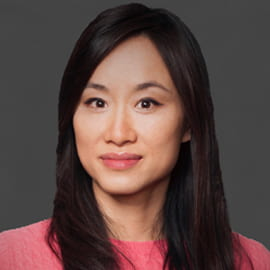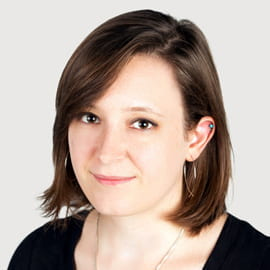Physics Career Day 2020
Dear physics students and postdocs,
The 4th Annual Physics Career Day will take place on Friday, January 17, 2020. My goal is for you to learn about the exciting and rewarding career opportunities open to you by hearing from our physics alumni with a variety of career paths and different levels of experience. See below the program and panel lists.
Cheers,
Young-Kee
Program
3:00 - 3:30 Refreshments (KPTC 309)
3:30 - 5:00 Panel discussions (KPTC 309)
5:00 - 6:00 Around table informal conversations (KPTC 309)
Panelists (U.Chicago Alumni)

Jennifer Chen
Jennifer Chen received her PhD in physics under the supervision of Sean Carroll at the University of Chicago. There she probed physics on the smallest scales by looking out to the furthest reaches of the universe. Jennifer now works at the Nicholas Institute for Environmental Policy Solutions (an academic think thank) at Duke University. She focuses on electricity and infrastructure policy design to account for newer resources and technologies, such as emissions-free resources, electricity storage, advanced transmission technologies, and demand-side resources. Jennifer has testified on infrastructure and grid modernization issues before the U.S. Congress and on electricity markets issues before the U.S. Federal Energy Regulatory Commission (FERC). Prior to joining the Nicholas Institute, Jennifer was an attorney with the Natural Resources Defense Council, where she led a coalition of environmental organizations and collaborated with other stakeholders to guide the evolution toward a low-emissions, efficient, and flexible electricity grid. Jennifer started her energy policy career as an attorney-advisor at FERC. Jennifer also has a J.D. from New York University School of Law. She is a member of the California Bar and the District of Columbia Bar and is admitted to the U.S. Court of Appeals for the District of Columbia Circuit. She serves as Vice President on the board of the Americans for a Clean Energy Grid.

Yangyang Cheng
Yangyang Cheng is a postdoctoral researcher at Cornell University, and a member of the CMS experiment at the Large Hadron Collider. Born and raised in China, Cheng received her Ph.D. in physics from the University of Chicago in 2015, and her Bachelor’s from the University of Science and Technology of China’s School for the Gifted Young. She writes the “Science and China” column for SupChina. Her essays have also appeared in Foreign Policy, MIT Technology Review, ChinaFile, Bulletin of the Atomic Scientists, and other publications. In addition to particle physics, Cheng’s research interests include the history of science in China and its relationship with the Chinese state, the ethics of new technology, and transnational governance. She tweets at @yangyang_cheng.

Kate Kirby
Kate Kirby earned her bachelor's degree in chemistry and physics from Harvard/Radcliffe College and her PhD from the University of Chicago. After a postdoctoral fellowship at the Harvard College Observatory she was appointed as Research Physicist at the Smithsonian Astrophysical Observatory and Lecturer in the Harvard University Department of Astronomy. From 1988 to 2001, she served as an Associate Director at the Harvard-Smithsonian Center for Astrophysics, heading the Atomic and Molecular Physics Division. From 2001-2007, she served as Director of the Institute for Theoretical Atomic, Molecular and Optical Physics (ITAMP) at Harvard-Smithsonian. From 2009-2014, she served as Executive Officer of the American Physical Society. In 2015, she was appointed the first Chief Executive Officer of the American Physical Society. Dr. Kirby's research interests lie in theoretical atomic and molecular physics, particularly the calculation of atomic and molecular processes important in astrophysics and atmospheric physics. She is a fellow of both APS and AAAS.

Lisa Nash
Lisa Nash finished her PhD at UChicago in July 2017 under the advisement of William Irvine. Currently, Lisa works as a data scientist and designer for IDEO Chicago. IDEO is a global design company that seeks to create positive impact through design. IDEO products range from Apple’s first manufacturable mouse in the early 1980s to current work on the future of mobility with Ford. At IDEO, Lisa works on interdisciplinary teams of designers, engineers, and data scientists to envision and prototype ways that data science and AI can be used in products and services that improve the lives of users. In her free time, Lisa rocks climbs and makes art in the ceramics studio.
Panel Moderator

Nicholas Schade
Nick Schade is a Postdoctoral Scholar in experimental soft matter physics at the University of Chicago. Nick earned his bachelor's degree in math and physics at Brown University. After college, he worked as a Systems Analyst at MIT Lincoln Laboratory, conducting simulations and working on rapid prototyping teams for projects funded by the US Department of Defense. He also taught physics in a public high school in Massachusetts. Nick earned his PhD in experimental soft matter physics at Harvard, where he investigated colloidal self-assembly as a tool for engineering optical metamaterials. He also participated in Harvard's Graduate Consortium on Energy and Environment and served as the Departmental Teaching Fellow in Physics, training new graduate students and first-time TAs in physics pedagogy. During his postdoctoral appointment at UChicago, he has experimentally demonstrated the existence of a geometric Hall effect without magnetic field and is also studying deposition processes and wetting behavior in colloidal systems.